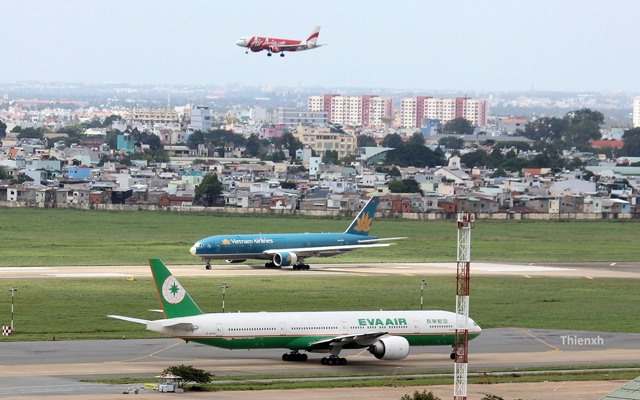 Society
Society

Deputy Prime Minister Trịnh Đình Dũng yesterday chose one of the three plans that were proposed to renovate Tân Sơn Nhất Airport in HCM City.
 |
| Tân Sơn Nhất airport serves 28 million passengers per year even though its capacity was planned to be only 25 million per year until 2020.— Photo vietnao.vn |
HÀ NỘI — Deputy Prime Minister Trịnh Đình Dũng yesterday chose one of three proposed plans to renovate Tân Sơn Nhất Airport in HCM City.
The chosen plan costs less than the two other plans and has a shorter completion while still increasing the airport’s capacity.
Tân Sơn Nhất airport serves 28 million passengers per year even though its capacity was planned to be only 25 million per year until 2020.
In previous meetings, Deputy PM Dũng asked leaders to develop a renovation plan for the airport which will increase its capacity to 40-50 million passengers per year.
The chosen plan includes the construction of parallel taxiways and connecting taxiways between the current runways and aircraft parking areas; rapid-exit taxiways and parallel taxiways between two runways, as well as the renovation of the current north runway.
A dual-use terminal (T3) with capacity of 10 million passengers per year, and a passenger terminal (T4) also with capacity of 10 million passengers per year will also be constructed.
The plan will take only three years to complete and cost VNĐ19.7 trillion (US$873 million) because it makes use of available military land, while still increasing the airport’s total capacity to 43-45 million passengers per year.
Deputy PM Dũng assigned the Ministry of Transport to direct a consultant firm to finalise the plan and report to the Prime Minister before February 25.
He reminded the transport ministry to revise the plan carefully and identify the projects it entails and sources of capital.
“State-owned enterprises will be responsible for contributing investment capital to the constructions that use the State’s budget such as taxiways and aircraft parking areas, while the passenger terminal and service areas should mobilise social capital,” he said.
“Traffic routes connected with the airport should be constructed with the funds of HCM City’s People’s Committee,” he added.
The transport ministry will work with the Department of Defence to identify the military land that will be used for the plan and determine a land transfer plan.
One of the two plans not chosen aimed to increase the airport’s capacity to 60 million passengers per year, taking 10-15 years to complete and requiring the clearance of 140,000 households, costing VNĐ201 trillion ($9.3 billion).
The other plan was similar to the chosen plan, with the addition of the construction of a parallel taxiway and an aircraft parking area in the north of the airport.
This option would have cost VNĐ61 trillion ($2.7 billion) and take 8-10 years to complete, increasing the airport’s total capacity to 43-45 million passengers per year.
At the meeting, the HCM City’s Department of Transport also reported on traffic construction development projects to ease congestion around the airport.
The city is studying four other projects, in addition to the eight projects that have been approved and are in progress, the department’s representatives said. — VNS




